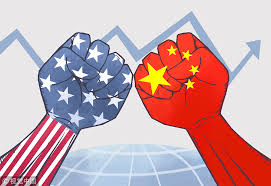The trade war is escalating to what might become a currency war. Other unintended consequences have followed, making global markets nervous.
August 12, 2019
By: Bobby Casey, Managing Director GWP

In this battle of will between the US and China, inevitably, the victims will be the private consumers.
At the G20 Summit in Japan, it there was hope that some sort of resolution was possible between the US and China and their trade war. Trump agreed to suspend tariffs while they were in talks.
Then Trump took to Twitter and decided to threaten tariffs starting at 10% on $300 billion worth of Chinese goods starting September 1st. This is in addition to the $250 billion in Chinese products upon which he’s already leveled 25% tariffs.
China responded by not only halting the purchase of any American farm products, but also letting the yuan drop below the usual 7-to-1 ratio to 6.92. Devaluing the yuan is one way to offset the costs of tariffs by basically cheapening the cost of doing business with China.
Trump lambasted China, calling them a “currency manipulator”. But all central banks are, so that doesn’t mean much other than Trump disapproves.
While the tariffs were not equitable between China and the US leading up to the trade war, but they were must closer than they’d been in years past. As we pointed out about a year ago:
[I]n 1993 the average US tariff was 5.6% while China’s was 39.1%, and the rest of the G7 nations (minus the US) was around 6.8%. Fast-forward 20 years and 3 presidencies to 2013, and you see the US drop to 3.4%, China drop to 9.6%, and the remainder of the G7 nations drop to 3.7%.
There really was no reason for matters to escalate this far.
Taxpayers have since bailed out farmers twice: once in 2018 to the tune of $12 billion, and recently announced a second bail out in 2019 for $16 billion.
That’s just one industry. Apparel, tourism, and automotive are also feeling the hurt, but it’s unlikely they will all get a bailout. That’s bitter-sweet. On the one hand, I’m opposed to government hand-outs of any sort; but I’m also opposed to government crippling industry!
On Monday, August 5, the DOW dropped 961 points at its lowest. It regained a little and the net loss was 767 points. This was in response to China’s retaliation.
Among those affected were tech, especially those that are vested in chip stock like Intel and AMD.
Although the DOW, S&P, and NASDAQ are all up by the double digits overall this year despite Monday’s events, the added tariffs and Chinese response are at some point going to weigh down the stock market to where we won’t see the bounce back.
This exchange has jarred investors considerably. The real concern here is whether this trade war morphs into a currency war. If the US matched the currency devaluation, that would hurt US purchasing power.
The US wouldn’t stand a chance in a currency war:
“Risks of Trump intervening in foreign exchange markets have increased with China letting the yuan go,” wrote Viraj Patel, FX and global macro strategist at Arkera, on Twitter. “If this was an all out currency war – the US would hands-down lose. Beijing [is] far more advanced in playing the currency game [and has] bigger firepower.”
It has a domino effect if the US also weakens its dollar to match the yuan. It affects Japan and Europe and their exports, as a weaker dollar wouldn’t buy as much from them. These are two regions that would struggle to take any more economic bad news.
Japan is recovering from multiple natural disasters. Europe can’t seem to get out of crisis mode with its member nations.
What US policy would be complete without a series of unintended consequences?
The Trump administration considers China’s move to weaken the yuan “dirty play”. But is there such thing as “clean play” when it comes to these kinds of disputes?
I’d mentioned earlier that tourism is also feeling the pain of the trade war. Hospitality is a service industry so how does that play in? Getting into a trade dispute doesn’t isolate the activity to just trade activity. It takes a toll on the entire foreign relationship.
Forbes touched on two non-tariff retributions. One is tourism:
Their numbers accounted for more than 40% of international arrivals on a six-month rolling basis back in 2012. Today their numbers are down 3%, and are a much lower percentage of total international arrivals, based on data from the U.S. Office of Travel and Tourism Industries and translated by data analytics firm Macrobond.
The other is Foreign Direct Investment (FDI):
FDI from China is now at its lowest level in 10 years.
When Trump was elected in 2016, China FDI was a record smashing $46.5 billion, more than double the 2015 record-breaking year of $15.3 billion. But after two and a half years with Trump in command, China investments here went from $29.7 billion in 2017 to $5.4 billion in 2018 to an estimated $3.5 billion this year, based on numbers from the Rhodium Group.
The sentiment is shifting toward a resignation that tariffs are here to stay. If that’s true, then certain assumptions and accommodations are needed. What should corporations assume about the tariffs levels? 25% across the board? When and where should they redirect their supply chains?
The US and China are not the only players in the sandbox. Each of them have alternatives to the other. China will source their soybeans elsewhere. US corporations will find a way to reroute their supply chains.
And all the consumers across the globe will pay for these two countries to have their pissing match.
Click here to schedule a consultation or here to become a member of our Insider program where you are eligible for free consultations, deep discounts on corporate and trust services, plus a wealth of information on internationalizing your business, wealth and life.

